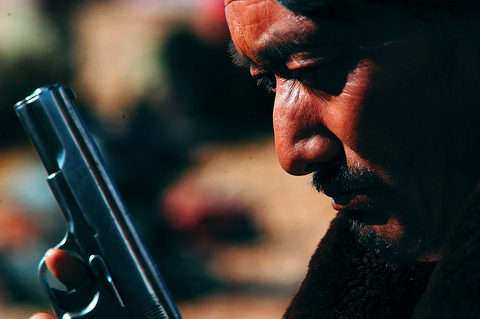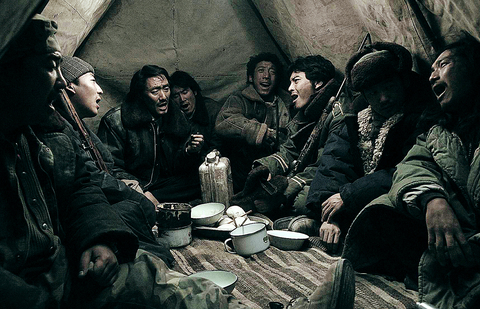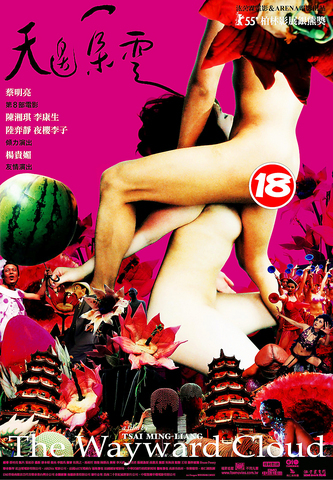This week only one Chinese-language movie will be released in Taiwan and it is a must see. It is the Best Picture Award winner of the 2004 Golden Horse Awards (
Kekexili is the third-least-inhabited area in the world and is at the northwest corner of the Tibetan plateau. This movie explores the complicated nature of human existence in this bleak, extreme environment where poverty and the natural elements make life almost unbearably difficult.
Kekexili is Lu Chuan's (

PHOTO COURTESY OF COLUMBIA ASIA
The film is shot with an almost documentary-like approach to tell about a Tibetan volunteer patrol chasing a ring of poachers who trade in antelope wool. The film is based on a true story witnessed by a journalist from Beijing.
Ritai (Dou Bujie) is the leader of the patrol squad and guides his team in pursuit of the poachers. He is determined to cross the snowy mountains and catch the gang leader.
Cinematographer Cao Yu (曹郁) presents stunning pictures of the scenery on the roads, giving nature a vital role in the plot. Its severity troubles both the patrol and the poachers, and blurs the distinction between good and evil.

PHOTOS COURTESY OF COLUMBIA ASIA
Besides the excellent collaboration between director Lu and Cao, the lead actor Dou Bujie gives an impressive portrayal of the patrol leader, while most of the non-professional actors add a sense of honesty and sincerity to the film.
Coming soon
Hoping to ride the tsunami-sized wave of media hype after his triumph at the Berlin International Film Festival, Tsai Ming-liang's (

PHOTO COURTESY OF HOMEGREEN FILMS
The film marks Tsai's first attempt to cross over from art-house cinema to the mainstream, though its abundant and explicit sexual content might keep it from that categorization.
The controversial film will play in more than 40 theaters nationwide starting next week.
Local distributor Long Hsiang Films (龍祥電影) announced last week that it acquired the rights to action film Seoul Raiders (韓城攻略), starring Tony Leung (梁朝偉), and the rights to Jay Chou's (周杰倫) debut film, Initial D (頭文字D). Seoul Raider will be released next week and Initial D will be released in Taiwan in July.

US President Donald Trump may have hoped for an impromptu talk with his old friend Kim Jong-un during a recent trip to Asia, but analysts say the increasingly emboldened North Korean despot had few good reasons to join the photo-op. Trump sent repeated overtures to Kim during his barnstorming tour of Asia, saying he was “100 percent” open to a meeting and even bucking decades of US policy by conceding that North Korea was “sort of a nuclear power.” But Pyongyang kept mum on the invitation, instead firing off missiles and sending its foreign minister to Russia and Belarus, with whom it

When Taiwan was battered by storms this summer, the only crumb of comfort I could take was knowing that some advice I’d drafted several weeks earlier had been correct. Regarding the Southern Cross-Island Highway (南橫公路), a spectacular high-elevation route connecting Taiwan’s southwest with the country’s southeast, I’d written: “The precarious existence of this road cannot be overstated; those hoping to drive or ride all the way across should have a backup plan.” As this article was going to press, the middle section of the highway, between Meishankou (梅山口) in Kaohsiung and Siangyang (向陽) in Taitung County, was still closed to outsiders

President William Lai (賴清德) has championed Taiwan as an “AI Island” — an artificial intelligence (AI) hub powering the global tech economy. But without major shifts in talent, funding and strategic direction, this vision risks becoming a static fortress: indispensable, yet immobile and vulnerable. It’s time to reframe Taiwan’s ambition. Time to move from a resource-rich AI island to an AI Armada. Why change metaphors? Because choosing the right metaphor shapes both understanding and strategy. The “AI Island” frames our national ambition as a static fortress that, while valuable, is still vulnerable and reactive. Shifting our metaphor to an “AI Armada”

The Chinese Communist Party (CCP) has a dystopian, radical and dangerous conception of itself. Few are aware of this very fundamental difference between how they view power and how the rest of the world does. Even those of us who have lived in China sometimes fall back into the trap of viewing it through the lens of the power relationships common throughout the rest of the world, instead of understanding the CCP as it conceives of itself. Broadly speaking, the concepts of the people, race, culture, civilization, nation, government and religion are separate, though often overlapping and intertwined. A government